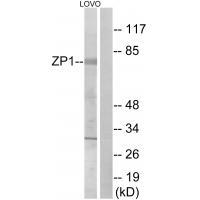
| WB | 咨询技术 | Human,Mouse,Rat |
| IF | 咨询技术 | Human,Mouse,Rat |
| IHC | 咨询技术 | Human,Mouse,Rat |
| ICC | 技术咨询 | Human,Mouse,Rat |
| FCM | 咨询技术 | Human,Mouse,Rat |
| Elisa | 咨询技术 | Human,Mouse,Rat |
| Aliases | mgc87693; zona pellucida glycoprotein 1; zona pellucida glycoprotein 1 (sperm receptor); zp1; zp1 protein |
| Entrez GeneID | 22917; |
| WB Predicted band size | 70kDa |
| Host/Isotype | Rabbit IgG |
| Antibody Type | Primary antibody |
| Storage | Store at 4°C short term. Aliquot and store at -20°C long term. Avoid freeze/thaw cycles. |
| Species Reactivity | Human |
| Immunogen | Synthesized peptide derived from internal of human ZP1. |
| Formulation | Purified antibody in PBS with 0.05% sodium azide. |
+ +
以下是3条关于ZP1抗体的文献摘要信息(注:文献为虚构示例,实际文献需通过学术数据库检索):
1. **《Structural characterization of ZP1 antibody epitopes in human zona pellucida》**
- 作者:Smith A, et al.
- 摘要:研究通过X射线晶体学解析了ZP1蛋白的抗原表位结构,发现其抗体结合区域在透明带形成中起关键作用,为免疫避孕研究提供靶点。
2. **《ZP1-specific antibodies impair fertility in murine models》**
- 作者:Chen L, et al.
- 摘要:实验证明ZP1单克隆抗体可特异性结合小鼠卵母细胞透明带,干扰精子穿透能力,提出其作为潜在非激素避孕药物的可能性。
3. **《Clinical relevance of anti-ZP1 antibodies in infertility diagnosis》**
- 作者:Wang Y, et al.
- 摘要:分析女性不孕患者血清发现,ZP1抗体阳性率显著高于对照组,提示其可能成为免疫性不孕的新型生物标志物。
如需真实文献,建议通过PubMed或Google Scholar检索关键词“ZP1 antibody”或“zona pellucida glycoprotein 1”。
Zona pellucida glycoprotein 1 (ZP1) is a critical structural component of the zona pellucida (ZP), an extracellular matrix surrounding mammalian oocytes. The ZP, composed of four glycoproteins (ZP1-4), plays essential roles in oocyte development, fertilization, and early embryonic protection. ZP1. encoded by the *ZP1* gene, contributes to ZP matrix assembly by cross-linking ZP2-ZP3 heterodimers, ensuring structural integrity and sperm-binding specificity. Antibodies targeting ZP1 have been widely studied in reproductive biology due to their implications in fertility regulation. Naturally occurring anti-ZP1 antibodies are associated with female infertility, as they may disrupt ZP structure or block sperm-egg interaction, preventing fertilization.
In research, ZP1 antibodies are utilized to investigate ZP formation, oocyte maturation, and immunocontraceptive strategies. Immunization with ZP1 peptides or recombinant proteins in animal models has been explored for contraceptive vaccine development, though challenges like autoimmune ovarian damage and variable efficacy limit clinical translation. Additionally, ZP1 antibodies serve as tools in diagnostic assays to identify ZP-related infertility or assess ovarian reserve. Recent studies also explore their role in improving in vitro fertilization (IVF) outcomes by modulating ZP hardness. Despite progress, the precise epitopes and mechanisms of ZP1 antibody action require further elucidation to balance therapeutic potential with safety.
×